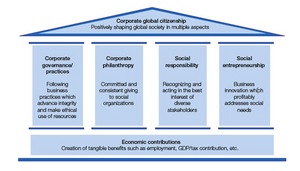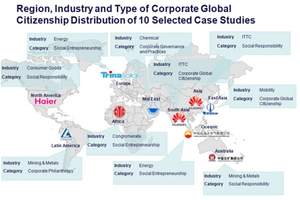BEIJING--(Marketwire - Mar 13, 2012) - Leading Chinese international companies are actively developing corporate citizenship efforts as they expand their global footprint, according to a new report being released today by the World Economic Forum. Prepared in partnership with The Boston Consulting Group (BCG) and titled Emerging Best Practices of Chinese Globalizers: The Corporate Global Citizenship Challenge, the report gives examples of how Chinese globalizers are aligning their profits with real and lasting contributions to the local communities in which they operate.
The concept of corporate global citizenship as introduced by Klaus Schwab, founder and executive chairman of the World Economic Forum, advocates companies engaging with other stakeholders to improve the society in which they operate. This concept embraces ethical corporate governance, philanthropy, and corporate social responsibility, as well as an emerging element -- corporate social entrepreneurship, or the integration of socially responsible principles and ideas into products of commercial value.
Over the past ten months, the report's research team reviewed the corporate-citizenship-related reports of 95 Chinese companies with large overseas operations and talked to 130 senior executives, researchers, and corporate citizenship experts. All companies face challenges as they become international, but instead of focusing on shortcomings, this study focused on emerging best practices. Ten outstanding case studies were selected and featured in the final report.
"This is the first time a comprehensive analysis of the corporate citizenship activities of China's globalizers has been undertaken," said Robert Greenhill, managing director and chief business officer at the World Economic Forum. "Our hope is these best practices become standard in the future."
The selected best practices are from across Asia, Africa, Europe, and Latin America and encompass employment-related procedures, supply chain management, green technology, community engagement, and peer cooperation, among other activities. For example, one Chinese information-and-communications-technology (ICT) company recruited local housewives -- a nontraditional work force -- as "phone ladies" in a remote area of Bangladesh. This initiative enabled local women to be gainfully employed while mobile coverage in the region increased.
Go Global
Under the "Go Global" policy, China has become the world's fifth-biggest outbound-foreign-direct investor. "As Chinese globalizers play a greater role in shaping global business, it is encouraging to find examples of innovative and effective approaches to corporate global citizenship," said Christoph Nettesheim, a Beijing-based senior partner at BCG.
Recognizing the cultural and societal differences in the process of internationalization, the report also points out key challenges and provides practical recommendations for Chinese companies that are still midway to fulfilling their corporate global citizenship.
- Some Chinese companies lack a sufficiently broad and thorough understanding of what corporate citizenship means. They assume it must be purely altruistic, but this implies a zero-sum tradeoff in which communities benefit at the expense of shareholders. Instead, corporate-global-citizenship ventures should align their business goals with social problems.
- Some Chinese companies are notably reluctant to communicate, such as in disclosing balanced citizenship information to the public, discussing corporate plans with external stakeholders, and demonstrating trust to local partners. A more open discussion and fuller partnership would help companies strengthen critical relationships that result in better outcomes for them and their communities.
- Chinese companies need to become better innovators of corporate citizenship practices. In the 30 years since economic reform, many of them have succeeded by following the well-established practices of Western companies. However, to become true corporate global citizens, Chinese companies must develop their own creative solutions as well as learn from the experiences of others.
"We hope this report helps the global community better understand Chinese companies' progress on corporate global citizenship, as well as domestic changes in China that have led to greater focus on this effort," said Nettesheim.
Greenhill stated, "We hope to promote dialogue on corporate global citizenship among the Chinese business community but also to share the findings of this report with other new players from emerging markets who plan to expand their business around the world."
A copy of the report can be downloaded at www.bcgperspectives.com.
To arrange an interview with one of the authors, please contact Eric Gregoire at +1 617 850 3783 or gregoire.eric@bcg.com, or Vivian Yang at +41 (0) 22 869 3534 or vivian.yang@weforum.org.
Notes to Editors
Find more information about the Corporate Global Citizenship at http://wef.ch/cgc
Watch Forum videos on YouTube at http://wef.ch/youtube or Youku at http://wef.ch/youku
Become a fan of the Forum on Facebook at http://wef.ch/facebook
Follow the Forum on Twitter at http://wef.ch/twitter and http://wef.ch/livetweet
Listen to the Forum Podcast at http://wef.ch/podcast
Read the Forum Blog at http://wef.ch/blog
Read Forum reports on Scribd at http://wef.ch/scribd
Upcoming Forum events at http://wef.ch/events
Subscribe to Forum News Releases at http://wef.ch/news
Connect with the Forum at http://wef.ch/connect
About The World Economic Forum
The World Economic Forum is an independent international organization committed to improving the state of the world by engaging leaders in partnerships to shape global, regional and industry agendas. Incorporated as a foundation in 1971, and headquartered in Geneva, Switzerland, the World Economic Forum is impartial and not-for-profit; it is tied to no political, partisan or national interests. http://www.weforum.org
About The Boston Consulting Group
The Boston Consulting Group (BCG) is a global management consulting firm and the world's leading advisor on business strategy. We partner with clients from the private, public, and not-for-profit sectors in all regions to identify their highest-value opportunities, address their most critical challenges, and transform their enterprises. Our customized approach combines deep insight into the dynamics of companies and markets with close collaboration at all levels of the client organization. This ensures that our clients achieve sustainable competitive advantage, build more capable organizations, and secure lasting results. Founded in 1963, BCG is a private company with 75 offices in 42 countries. For more information, please visit bcg.com.
About bcgperspectives.com
Bcgperspectives.com is a new website -- available on PC, mobile phone, and iPad -- that features the latest thinking from BCG experts as well as from CEOs, academics, and other leaders. It covers issues at the top of senior management's agenda. It also provides unprecedented access to BCG's extensive archive of thought leadership stretching back almost 50 years to the days of Bruce Henderson, the firm's founder and one of the architects of modern management consulting. All of our content -- including videos, podcasts, commentaries, and reports -- can be accessed via PC, mobile, iPad, Facebook, Twitter, and LinkedIn.

